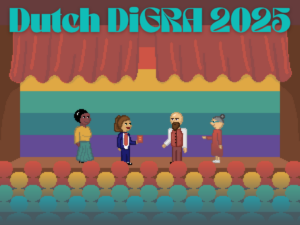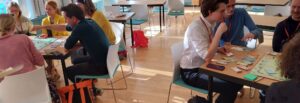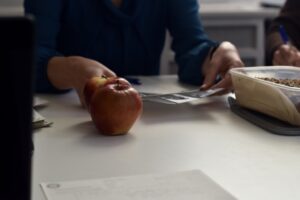Educational Sciences

Dutch DiGRA Symposium 2025: Futures for Game and Play Research.
Programme, sign-up sheet, and abstracts now available! This year the Dutch DiGRA is hosted by Utrecht University. The programme is filled with research about the future of game studies, gamification and play in contemporary society, and much more! All are welcome, so sign up using the Google Form in this post!

Hybrid Franchise Hacking Workshop (Gamelab x Man Met)
On April 30th 2025, the Utrecht Gamelab and the Manchester Game Centre at Manchester Metropolitan University collaborated on a first-of-its-kind hybrid three-hour co-design workshop, building on the work of Chloe Germaine and Paul Wake on ‘game hacking’ and the ‘franchise hacking’ technique developed by the Utrecht Game Lab on the basis of Germaine and Wake’s

Funded PhD position: Playing the Hidden Curriculum
Connected to our project Playing the Hidden Curriculum, we’re recruiting a fully funded PhD student at Utrecht University/University Medical Center Utrecht. The PhD will be conducting research into the “hidden curriculum” prevalent at Utrecht University, using games and play as heuristic to explore the hidden curriculum’s goals and rules (i.e., prevalent norms, social and institutional

Franchise Hacking Workshop (Gamelab x WUR Games Hub)
The workshop is part of the ongoing USO project Crisis to Resilience (2024-2027), which develops and evaluates techniques based on creative practices like game-making and community gardening/biophilia to foster resilience counter climate anxiety as well as other negative climate emotions. The workflow used in this workshop is built on top of free and accessible tools

Taking Perspectives with Game Design: Teachers wanted for pilot!
The participants of the Playing Perspectives workshop at the Onderwijsfestival at Utrecht University are fully engaged in conversation. The striking photo on the table is what they’re talking about. Because what do you see in this photo? What stands out and what is your interpretation? This turns out to be quite different for each participant.

Redesigning Monopoly to Foster Climate Resilience
On March 6th, 2025, as part of the annual Onderwijsfestival at Utrecht University, Flora Roberts, Larike Bronkhorst and Stefan Werning organized a workshop on how co-designing iconic (board) games like Monopoly can facilitate imagining sustainable futures and help mitigate negative and cultivate positive climate emotions.

Fostering an Open Mind – First Test of WP2
On June 7th 2024, the Fostering an open mind and open attitude in higher education using games and art-based educational activities (Open Mind) project ran an initial play test of the first two components of Work Packet 2 (WP2), a toolbox to aid students in building games that deal with often complex and polarizing topics in an approachable manner.

Playing the Hidden Curriculum
Playing the Hidden Curriculum: Exposing, materializing and questioning the unwritten rules of higher education is a research project that aims to adress the unwritten social and cultural rules in education, so that the UU will foster its education in a more social and inclusive way.

Fostering an open mind and open attitude in higher education using games and art-based educational activities
With the use of art and media tools such as dialogical art, game play, and game development, this project aims to foster a space wherein it is possible to discuss complex topics, and for students with diverging opinions to be able to civilly discuss while learning from one another and developing a greater understanding of those whose opinions may differ from their own.

Spationomy 2.0
The Spationomy 2.0 project was started in October of 2019, and concluded with a final conference held in November of 2022. The project was funded by the Erasmus+ program of the European Union.
